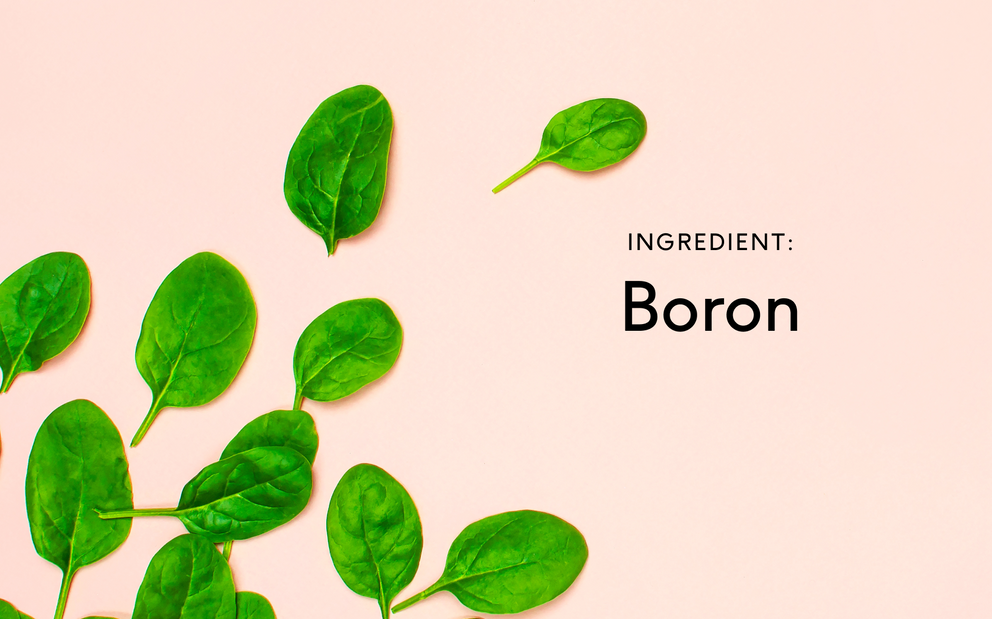Learn About Boron in 5 Minutes
Table of contents

What is boron?
Boron is a mineral that primarily regulates the activity of essential minerals. This nutrient helps “boost” the activity of calcium and magnesium, and boron also serves a variety of direct purposes within your body. However, it’s relatively hard to source enough boron from food, which makes many people choose to derive this nutrient from supplements.
- Regulates the action of other minerals in the body
- May help with steroid-related conditions like arthritis
- Improves both bone metabolism and overall metabolic processes
- Boron deficiency decreases brain activity & causes malnutrition-like symptoms
- May improve memory, focus, and other nervous system functions
- May help with postmenopausal symptoms
Why we love boron
Also known as sodium borate or sodium tetra-borate, disodium borate is most commonly referred to as borax. While this powdery, mineral substance is usually used in cleaning applications, it’s also a highly bioavailable source of boron, which is under consideration to become one of the essential nutrients.
Since boron’s effects are more subtle than many of the other trace minerals (copper, iron, zinc, etc.), the nutritional benefits of this substance haven’t been widely researched. Your body doesn’t need very much boron, and small quantities of this mineral are widely available in green, leafy vegetables and certain kinds of non-citrus fruit.
If you don’t eat enough fruits and vegetables, however, you could easily be at risk of boron deficiency. This condition takes a long time to set in, and its symptoms are usually relatively mild. At the same time, however, losing even a small amount of your cognitive capacity reduces your efficiency, so you can’t afford to become evens slightly deficient in boron. That’s why we decided to include disodium borate in our brand-new Feel Multivitamin™.
Unbelievable benefits of boron
While the effects of boron aren’t as overt as some of the other ingredients, we added to our Feel Multivitamin™ V2, this mineral truly shines in support roles anyway. Here are some of the ways that boron both directly and indirectly impacts your health and well-being.
Mineral Regulation in the Body
Boron helps your body process a variety of different minerals. Without boron, for instance, your body would be practically incapable of producing calcium, which is partially due to boron’s interaction with vitamin D.
One of the first things you learn as you research nutrition is that vitamin D dramatically improves the bioavailability of calcium. Since this mineral is required for bone growth and the prevention of osteoporosis, proper calcium absorption is critical to your health.
In the body, boron and vitamin D team up to improve the bioavailability of calcium and keep your bone health intact. Boron is also the “missing link” for improving the bioavailability of other minerals, which are traditionally quite difficult for your body to process. Many modern nutrients have special lab-formulated mechanisms that improve nutrient bioavailability—think of boron as the analog version.
As Boron has important interactions with other vitamins and minerals within the body, we've included 0.5mg of Boron in Feel Multivitamin.
Metabolic Benefits
By increasing the action of calcium, boron improves bone metabolism, which is the rate at which bone cells divide and die. Boron also facilitates the absorption of magnesium, which is critically involved in carbohydrate metabolism.
Magnesium deficiency can cause inflammation, and since boron improves the bioavailability of this nutrient, it is an indirect antioxidant and anti-inflammatory. Overactive inflammation can adversely affect your metabolism; oxidative stress attacks your cells and makes them die faster, which increases the likelihood of genetic transcription errors or early senescence factors.
Neurological Benefits
The human nervous system is one arena in which boron appears to exert direct beneficial effects. While it’s easy to forget, the brain and nervous system operate via electrical signals, and the intensity of that signalling affects every aspect of neurology from reflexes to consciousness.
A review of five separate studies conducted on the psychological effects of boron found that deficiency in this essential mineral causes “decreased brain electrical activity similar to that observed in nonspecific malnutrition.” Interestingly, becoming deficient in boron seemingly reduces the actual electrical potency of your nervous system signalling, which might be likened to reducing the power of a radio signal if the brain is the receiver.
When you are deficient in boron, this study found, you’ll have “poorer performance on tasks of motor speed and dexterity, attention, and short-term memory.” This scientific review concludes that boron “important for brain and psychological function in humans,” which just underscores why we decided to include this incredible ingredient in Feel Multivitamin™.
Menopause Benefits
A landmark 1987 study concluded that boron helps with the symptoms of menopause. So far, these results haven’t been widely corroborated, but it stands to reason that further research into this mineral will yield more concrete results. Boron is one of the least-researched trace minerals, which means that it might be quite some time until we fully get to the bottom of how this nutrient might help with menopause. Since boron doesn’t appear to be highly toxic except in extremely large doses or built-up levels in the body, postmenopausal women in search of relief have no reason not to try a supplement that contains your daily RDV of boron.
Is boron water-soluble or fat-soluble?
Unlike many minerals, boron is water-soluble. Therefore, this nutrient absorbs into your tissues faster than most essential minerals.
Where can boron be found naturally?
Boron is only present in food in very small quantities, but many different types of foods contain this nutrient. Apples, milk, and potatoes, for instance, all contain small quantities of boron. If you want to derive as much boron from food as possible, however, you should try eating lots of green, leafy vegetables like kale and spinach.
5 foods/drinks containing boron
1. Kale
2. Spinach
3. Beans
4. Apples
5. Dairy
What is the recommended daily value for boron?
While many different studies have determined that boron plays an essential role in human health, this substance has not been accepted as an “official” essential mineral. However, it’s still highly recommended that you consume a reasonably high quantity of boron in your diet.
Can you absorb enough of boron from food?
Since boron is only present in food in very small quantities, it can be hard to consume enough boron in your diet. Taking a daily dietary supplement that contains boron, however, will ensure that you’re fully covered.
Why is boron necessary for your body?
Boron mainly regulates the action of magnesium and calcium. Magnesium is a potent antioxidant that serves dozens of purposes in the body, and calcium is essential to bone growth and health. Boron works with vitamin D to improve your calcium absorption, and it also helps with the bioavailability of other minerals.
Functions of boron
Bioavailability enhancer: Boron helps your body digest and absorb minerals like calcium, zinc, iron, copper, and magnesium. These minerals usually have very low bioavailability.
Bone density protector: By improving the absorption of calcium, boron prevents osteoporosis and helps maintain proper bone density.
Antioxidant booster: By boosting the bioavailability of magnesium, boron helps fight back against free radicals and prevent oxidative stress.
Symptoms of boron deficiency
Since boron has not been named as an essential mineral, it isn’t technically possible to become deficient in this nutrient. If your body lacks boron, however, you might experience more inflammation and oxidative stress, and you may be more at risk of mineral-deficiency-related conditions like anaemia and osteoporosis. People who don’t eat animal products are at even greater risk of mineral deficiencies, and boron helps boost the bioavailability of the minerals used in Feel multivitamins™.
How long do you need to take boron to start experiencing its benefits?
Since boron is water-soluble, the beneficial effects of this mineral should set in rapidly after ingestion.
Consistency is key and our research recommends taking your Feel supplements for at least 3 months to allow your body to adjust and provide the desired benefits.
How long does it take for your body to digest/absorb boron?
Boron is generally considered to have very high bioavailability. Therefore, this substance absorbs into your body very quickly, and it also has close to a 100% absorption rate.
How long does boron stay in your body after you take it?
Since this mineral is water-based, boron doesn’t usually stay in your body much longer than 24 hours.
Is boron an antioxidant?
Boron does not appear to be a direct antioxidant. However, it dramatically improves the bioavailability of magnesium, which is one of the most powerful antioxidants. Therefore, taking boron significantly improves your body’s antioxidant potential.
Can you overdose on boron? What are the effects?
Boron is toxic in extremely high quantities. However, it is very hard to consume enough boron to overdose. Potential effects of boron overdose include nausea, tremors, bleeding, and coma.
Does boron dissolve, flush out, or build up in the body?
Boron’s main function is to boost the bioavailability of other nutrients. Therefore, this mineral is excreted rapidly after use.
Can you take boron during a diet?
Boron does not interfere with dietary restrictions.
Are there synthetic forms of boron?
Most types of boron found in supplements are synthesised in laboratories. However, this point of origin does not appear to reduce the bioavailability of boron or cause any other unwanted effects.
Why might synthetic forms of boron be better?
Boron is very hard to extract from plants. Synthetic boron is much more economical.
Absorption rate of synthetic boron
Synthetic boron appears to absorb into your system at roughly the same rate as the boron found in food.
Why might natural forms of boron be better?
At this time, there is no reason to suspect that natural boron is superior to synthetic boron.
How to take boron
You can consume boron in food, or you can ingest this mineral in supplements. Vegans should consume boron supplements to make sure they don’t become deficient in other minerals.
Boron trends in medicine
A clinical study was recently facilitated that showed a clear link between boron and obesity prevention. While it’s possible that the ingestion of other nutrients may have also played a role, this study found that enjoying a boron-rich diet improved blood lipid profiles in obese patients and facilitated rapid weight loss and BMI improvements. This research underlines how little we truly know about boron and how this mineral behaves in the body.
Why everyone should be taking WeAreFeel supplements
The world of nutrition is anything but static, and the dietary recommendations of 50 years ago might no longer apply today. Boron is one of the most researched nutrients in the world, and every sign indicates that we’ve only started learning the truth about everything this mineral can do.
While many supplement manufacturers would be content to stick with the tried-and-true, we think that your health isn’t something you should risk. With our Feel Multivitamin™, we’ve completely revolutionised our original supplement by incorporating promising nutrients like boron. That’s only the beginning of the amazing changes we’ve made to your convenient daily multivitamin — from lutein to reishi mushrooms to bioperine, we’ve pulled out all the stops to make the new form of our industry-reshaping supplement our even more legendary.
Here’s the Proof
- The role of boron in nutrition and metabolism.
- Nothing Boring About Boron
- Magnesium deficiency and increased inflammation: current perspectives
- The importance of boron nutrition for brain and psychological function.
- Effect of dietary boron on mineral, estrogen, and testosterone metabolism in postmenopausal women.










































 Back
Back





